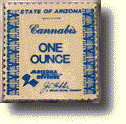 PHOENIX, Arizona - What's surprising is not so much that this conservative law-and-order state seems to have legalized the sale of marijuana, but that it took even the most ardent of the state's pot smokers about a decade to figure it out.
PHOENIX, Arizona - What's surprising is not so much that this conservative law-and-order state seems to have legalized the sale of marijuana, but that it took even the most ardent of the state's pot smokers about a decade to figure it out."When I first read the law I thought, O.K.., I see this, but I didn't think you could really do it," said Bill Green, an aerospace engineer, while sharing a joint with several other marijuana enthusiasts in front of the copper-domed state capitol on a recent afternoon. "I never had any idea I could buy a license and be a law-abiding citizen while I burned a joint. But I pay my marijuana tax now. I'm as legal as you get."
A license to sell marijuana? In the middle of a "war" on drugs, when national leaders are debating how best to wipe out drug use and trafficking? It may sound like a Cheech and Chong episode, but since 1983 Arizona has offered a "Cannabis and Controlled Substances Dealer's License."
The state insists that the license is a law-enforcement tool, a way of hitting up dealers for unpaid taxes, but a number of smirking Arizonians, and at least one judge, disagree. A license, they say, is a license. the annual fee for this one is $100, payable by check or money order to the Department of Revenue, License and Registration Section.
 The state also requires tax stamps ($10 per ounce, or about 10 percent of the street price) that, as carefully explained in the statute, must be affixed to the bags of pot when they are sold. It asks that dealers specify whether the drug will be sold by the gram or the ounce. The state has even improved the tax stamps, which bear a handsome little cactus symbol, to satisfy users.
The state also requires tax stamps ($10 per ounce, or about 10 percent of the street price) that, as carefully explained in the statute, must be affixed to the bags of pot when they are sold. It asks that dealers specify whether the drug will be sold by the gram or the ounce. The state has even improved the tax stamps, which bear a handsome little cactus symbol, to satisfy users.
"The old stamps just kind of fell off," explained Peter Wilson, the chairman of the Arizona chapter of the National Organization for the Reform of Marijuana Laws or NORML, a group promoting legalization. "So they redesigned them and put on a better adhesive."
Mr. Wilson was cheerful in describing such details despite the fact that he was arrested last year for marijuana possession.His case has become the test for a law whose stated intent was to allow the state to grab the ill-gotten gains of drug dealers but has wandered off, like many things under the influence of marijuana, in a far different direction.
So far, at least, the license Mr. Wilson lawfully obtained has become a shield because he has persuaded a court - much to the shock and dismay of prosecutors - that the state could not have it both ways, making him pay for the privilege of dealing or possessing pot and then arresting him for doing so.
It is a standoff that the legislature has indirectly encouraged through inaction. Indeed, ever since the case popped up a year ago many legislators have seemed intent on running from the licensing issue with as much embarrassed haste as they can muster.
While amusing in some ways, perhaps, Arizona's bizarre flirtation with what amounts to an ad hoc experiment in drug legalization demonstrates the rarely acknowledged shades of gray that underlie the battle over drugs, particularly in an election year when politicians, afraid of sounding soft on drugs, are presenting the issue in stark black and white.
Surveys show that the vast majoritiy of Americans support strict enforcement against the sale and use of harder drugs like methamphetamine and cocaine.
But Arizona's situation and the state government's two-sided reaction to it - condemning marijuana use while doing nothing to change the licensing law - reflect the growing sense among Americans that marijuana is different from other drugs.
A number of people seem to feel that pot, if not acceptable, does not rank as a threat with cocaine, heroin or even, some argue, alcohol, and that users ought to be left alone.
Law-enforcement officials often describe marijuana as a "gateway" drug that appeals to teenagers and leads to harder drugs and ruined lives.
But prominent people ranging from Vice President Al Gore to Representative Susan Molinari, the keynote speaker at the Republican national convention, have admitted using - and then dropping - pot.
Many states, including New York and California, have virtually decriminalized possession of small amounts, and most people convicted of possession are given probation.
Arizonans will vote next month on a proposition, placed on the ballot through a petition drive, that would almost completely decriminalize marijuana possession, though it has been billed as a measure to make certain drugs available for medical purposes.
Local, state and federal officials have harshly condemned the initiative, but it is given a reasonable chance of passing.